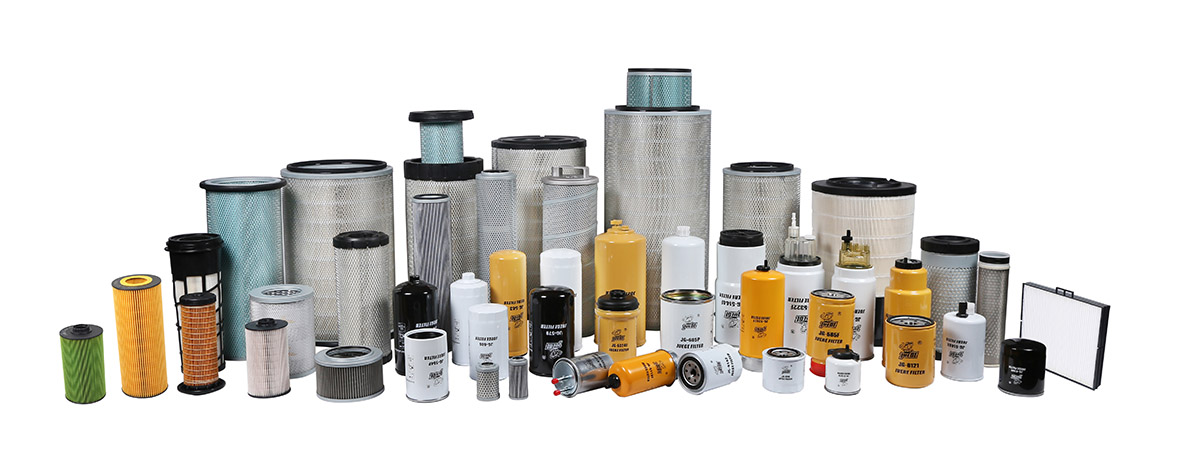
1. Under what special circumstances do you need to replace the oil filter and fuel filter?
The fuel filter is used to remove impurities such as iron oxide and dust from the fuel, prevent blockage of the fuel system, reduce mechanical wear, and ensure stable engine operation.
In general, the replacement cycle of the engine fuel filter is 250 hours of operation for the first time, and then every 500 hours of operation. The specific replacement time should be flexibly controlled according to the different fuel quality levels.
When the filter pressure gauge alarms or indicates abnormal pressure, it is necessary to check the filter for any abnormalities. If so, it must be replaced.
When there is leakage or deformation on the surface of the filter element, it is necessary to check if there are any abnormalities in the filter. If there are any, they must be replaced.
2. Is the filtering accuracy of the engine oil filter better?
For an engine or equipment, an appropriate filter element filtration accuracy should achieve a balance between filtration efficiency and ash capacity. Using a filter element with excessively high filtration accuracy may shorten the service life of the filter element due to its low ash capacity, thereby increasing the risk of premature blockage of the oil filter element.
3. What is the difference in the effect of inferior engine oil and fuel filter on equipment compared to pure engine oil and fuel filter?
Pure engine oil and fuel filter elements can effectively protect equipment and extend its service life; Poor quality engine oil and fuel filter elements cannot effectively protect equipment, extend its service life, and even worsen its condition.
4. What benefits can the use of high-quality engine oil and fuel filter bring to the machine?
The use of high-quality engine oil and fuel filters can effectively extend the lifespan of equipment, reduce maintenance costs, and save users money.
5. Is it unnecessary to use high-quality filter elements since the equipment has passed the warranty period and has been in use for a long time?
Old equipment engines are more prone to wear and tear, resulting in cylinder pulling. Therefore, old equipment requires high-quality filter elements to stabilize gradually escalating wear and maintain engine performance.
Otherwise, you will have to spend a lot of money on repairs, or you will have to discard your engine in advance. By using pure filter elements, you can ensure that the total operating cost (total cost of maintenance, repair, major repairs, and depreciation) you spend is the lowest, and it can also extend the service life of the engine.
6. As long as the filter element is cheap, can it be installed perfectly on the engine?
Many domestic filter element manufacturers only simply copy and imitate the geometric dimensions and appearance of the original parts, and do not pay attention to the engineering standards that the filter element should meet, or even do not understand the content of the engineering standards.
The design of the filter element is to protect the engine system. If the performance of the filter element cannot meet the technical requirements and loses its filtering effect, the performance of the engine will be significantly reduced and the service life of the engine will be shortened.
For example, the lifespan of a diesel engine is directly related to the 110 to 230 grams of dust ingested in advance of engine damage. Therefore, inefficient and inferior filter elements will cause more magazines to enter the engine system, leading to early engine overhaul.
7. The filter element used has not caused any problems to the machine, so is it unnecessary for users to spend more money on high-quality filter elements?
You may or may not immediately see the impact of inefficient and inferior filter elements on the engine. The engine seems to operate normally, but harmful impurities may have already entered the engine system and started causing corrosion, rust, wear, and other damage to engine parts.
These damages are implicit and will erupt when they accumulate to a certain extent. Although there are no signs at present, it does not mean that the problem does not exist.
Once a problem is discovered, it may be too late, so insisting on using high-quality and guaranteed filter elements can provide maximum protection for the engine.
Post time: May-18-2023
